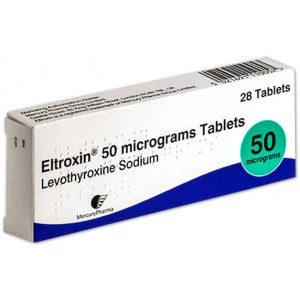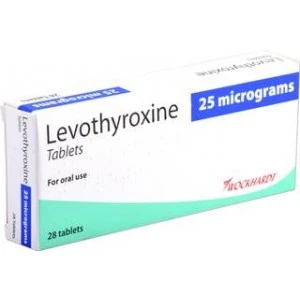PLEASE NOTE: This treatment is not available through our online pharmacy service. This page is for information only. If you are experiencing any of the symptoms related to the condition(s) this medication treats, we strongly recommend that you see your GP in person.
Underactive thyroid
An underactive thyroid, also known as hypothyroidism, is a condition in which your thyroid does not produce enough hormones. Symptoms include being sensitive to cold, depression, tiredness and weight gain, all of which can come on slowly over time. See Symptoms for more details.
Hypothyroidism is treated with daily hormone replacement tablets, which increase the levels of thyroxine in your blood. This helps to regulate your body's metabolic rate, which, over time, reduces the symptoms of hypothyroidism.
To order Levothyroxine, select the dosage and package type below, and click Continue to Medical Questions. It is advisable to read all the information on this page before continuing.
Eltroxin
- Replenishes low levels of T3 and T4 hormones
- Treats hypothyroidism symptoms
- Available from our UK-registered pharmacy
Levothyroxine
- Effective treatment for underactive thyroid
- Repeat prescription available
- Prescribed by a registered doctor
What is hypothyroidism?
The thyroid gland is a butterfly-shaped organ at the base of the neck, in front of the trachea (windpipe). It comprises two lobes (the butterfly's wings) which are connected by a piece of tissue called the isthmus (the butterfly’s body).
Hypothyroidism (or underactive thyroid) is a hormone deficiency in which the thyroid gland does not produce enough of the hormone Thyroxine, which is used to regulate metabolism.
An underactive thyroid is more common in people between 40 and 50 and affects ten times more women than men. It's estimated that 1 in 1,000 men have hypothyroidism, while the condition is much more prevalent in women, affecting 10 in 1,000 women.
What are the symptoms of an underactive thyroid?
Symptoms of an underactive thyroid can be easily misinterpreted as several other conditions. It can take a long time for symptoms to develop, which means you may not realise you have a problem for many years.
If you’re concerned you may have an underactive thyroid, speak to your GP about getting tested for this condition.
Your symptoms may include:
- Brittle hair and nails
- Constipation
- Decreased libido (sex drive)
- Depression
- Dry skin and hair
- Irregular or heavy periods
- Muscle aches, weakness and cramps
- Pain, numbness and tingling sensations in the hand and fingers
- Sensitivity to the cold
- Slowing of movements and thoughts
- Tiredness
- Weight gain
What causes an underactive thyroid?
The most common cause of hypothyroidism is an autoimmune disorder called Hashimoto's thyroiditis. This autoimmune disease causes your body's immune system to attack the thyroid, damaging the cells and reducing the thyroid's ability to produce T3 and T4 hormones.
Another common cause of an underactive thyroid is over-response or over-use of treatments for hyperthyroidism or an overactive thyroid, which can cause your levels to drop too low, resulting in hypothyroidism.
Surgery, such as a thyroidectomy, can cause a drop in thyroid activity. Thyroidectomy is the surgical removal of all or part of the thyroid. It is performed for thyroid cancer, goitre and hyperthyroidism.
How is an underactive thyroid diagnosed?
To find out whether you have hypothyroidism, a thyroid function test is required. A sample of blood is taken, from which your hormone levels are tested.
Speak to your GP about being tested for an underactive thyroid if you’re concerned.
In the UK, all babies are screened for congenital hypothyroidism during the early stages of their development.
What treatments are available for an underactive thyroid?
Typically, hypothyroidism is treated with daily hormone replacement tablets, such as Levothyroxine. These tablets increase the levels of thyroxine in your body. Levothyroxine helps to regulate the body's metabolic rate, which, over time, reduces the symptoms of hypothyroidism.
This treatment is lifelong, but shouldn't stop you from living a normal and healthy life.
If left untreated, an underactive thyroid can develop into the following symptoms:
- Anaemia (iron deficiency)
- Hearing loss
- Increased risk of heart disease
- Lower-pitched and hoarse voice
- Puffed up face
- Slow heart rate
- Thinning or partly missing eyebrows
Prescription Doctor offers Levothyroxine as a treatment option for an underactive thyroid, available in tablet form and dosages of 25mcg, 50mcg, 75mcg or 100mcg.
To find out more about Levothyroxine, including frequently asked questions, click here.
To order Levothyroxine, select your desired dosage and package type, then click 'Continue to Medical Questions'.
© 2013 - 2025 Al Muhsineen Limited. All Rights Reserved. Registered Pharmacy: 34 Halliwell Road, Bolton BL1 8RL. Registered Office: 254 First Floor, Shearbrow, Blackburn, England, BB1 8DS







